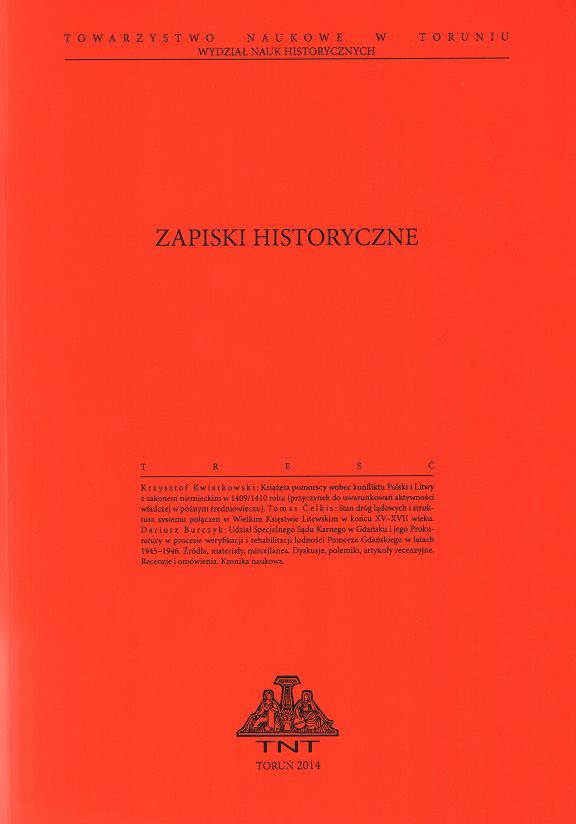Kilka uwag na temat politycznych okoliczności małżeństwa Wasyla Moskiewskiego i Zofii Witoldówny zawartego w 1391 roku
Some Remarks on the Political Circumstances of the Marriage of Vasily I of Moscow and Sophia of Lithuania, Concluded in 1391
Author(s): Marcin GralaSubject(s): Diplomatic history, Political history, 13th to 14th Centuries
Published by: Towarzystwo Naukowe w Toruniu
Keywords: Dmitry of the Don; Vytautas the Great; Vasily I of Moscow; chronicles; relations between Lithuania and Moscow; dynastic union; Grand Duchy of Lithuania; Grand Duchy of Moscow; Golden Horde
Summary/Abstract: The marriage of Duke Vytautas the Great’s daughter Sophia to the Grand Duke of Moscow Vasily in 1391 was a momentous event that impinged on the course of history. Although the circumstances in which this marriage was concluded address extremely important historical issues, such as relations between Lithuania and Moscow, Vytautas’ biography, and the politics of the Grand Duchy of Moscow towards the end of the fourteenth century, historiography has not recorded many attempts to study them. This is probably due to the rather vague primary sources which are dominated by the accounts contained in the chronicles. The author of the article makes an effort to analyse them, which, combined with other evidence, as well as a review of the political situation at the time, led him to believe that it was the Moscow side that initiated the talks on the marriage of Sophia and Vasily. The Grand Duke of Moscow, Dmitry of the Don, had been looking for the possibility of a dynastic rapprochement with the ruling circles of the Grand Duchy of Lithuania for a long time. The conclusion of the Polish-Lithuanian agreement in Krevo (1385), uncertain situation in the Golden Horde and the desire to strengthen the position of his son were the reasons that could force the Moscow ruler to act more decisively in this field. Therefore, having left Tartar captivity at the end of 1385, Vasily son of Dmitri of the Don, went west, where he took the opportunity of meeting Vytautas to start first talks. The negotiations were interrupted due to a rather weak political position of Vytautas before 1389. They were resumed when it turned out that Władysław Jagiełło, after taking the throne in Kraków, did not intend to forgo his active policy in Eastern Europe. Therefore, when Vytautas fought together with the Teutonic Knights to seize power in Lithuania, Moscow decided to support his efforts. In this way, the duke, with his allies in the Teutonic Order and strong ties with Moscow, became a dangerous rival for Władysław Jagiełło. Such a turn of events could have influenced the Polish king’s decision to reconcile with his cousin yet again.
Journal: Zapiski Historyczne
- Issue Year: 85/2020
- Issue No: 1
- Page Range: 141-162
- Page Count: 22
- Language: Polish

